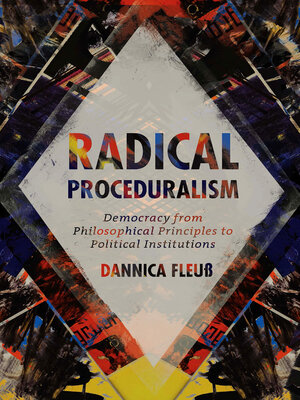Radical Proceduralism
ebook ∣ Democracy from Philosophical Principles to Political Institutions
By Dannica Fleuß

Sign up to save your library
With an OverDrive account, you can save your favorite libraries for at-a-glance information about availability. Find out more about OverDrive accounts.
Find this title in Libby, the library reading app by OverDrive.



Search for a digital library with this title
Title found at these libraries:
| Library Name | Distance |
|---|---|
| Loading... |
Democratic politics depend on citizen participation, trust and support. While this support in democratic institutions and political elites is declining, public and scholarly discourse frequently suggests counteracting the challenge by strengthening the role of experts in political decision-making, yet such reform proposals convey a paternalistic threat that contravenes fundamental democratic principles.
Proposing an alternative, 'radical proceduralist' understanding of democratic legitimacy and institutional reform, Radical Proceduralism argues that there is no such thing as 'political truth' or 'correctness' that could justify experts wielding political power. Rather, the only criterion for democratic legitimacy is the fair and equal inclusion of all affected citizens.
Radical Proceduralism bridges the gap between political philosophy and practical institutional experimentation asking us to bring citizens back in and to engage them in a dialogue about 'the rules of the democratic game' and proposing institutional devices that figure as 'conversation starters' and facilitate such dialogues.
Proposing an alternative, 'radical proceduralist' understanding of democratic legitimacy and institutional reform, Radical Proceduralism argues that there is no such thing as 'political truth' or 'correctness' that could justify experts wielding political power. Rather, the only criterion for democratic legitimacy is the fair and equal inclusion of all affected citizens.
Radical Proceduralism bridges the gap between political philosophy and practical institutional experimentation asking us to bring citizens back in and to engage them in a dialogue about 'the rules of the democratic game' and proposing institutional devices that figure as 'conversation starters' and facilitate such dialogues.







